Winning in the Age of AI Search: How Brands Can Thrive as Search Evolves
Search is changing faster than ever. With the rise of AI-powered features like Google’s AI Overviews and AI Mode, the familiar “10 blue links” are...
Read moreTechnical SEO specialist Simon Parker looks in depth at the OneHydra enterprise-level SEO tool to find out how its large-scale SEO automation platform can optimise both paid and organic search opportunities for your website.
OneHydra takes its name from the Greek mythological creature Hydra – a multi-headed monster. Every time a head was cut off it grew two more. The analogy between this mythical beast and the large-scale SEO tool is that neither have limitations. OneHydra can scale 100,000 touch points. It can tackle a website of any size and analyse any number of keywords. It is, in many senses, a beast of an SEO tool.
The OneHydra product suite offers large-scale SEO through an integrated approach, divided into Insight @ Scale, Recommendations @ Scale and Delivery @ Scale. It basically automates SEO and “searchandising” at scale to increase client revenue, with a focus on reach not rank.
Reporting PPC and SEO side by side, the aim is to take a holistic approach to optimising a site focusing on its on-page content.

OneHydra is best suited to retailers whose websites span thousands or even hundreds of thousands of pages and/or products. . This is because its scale can enable you to track an unlimited number of keywords. However, companies do need to bear in mind the man-hours associated with prioritising and implementing changes, and whether or not the scale of their business warrants an enterprise-level solution or not.
OneHydra will never completely replace an agency or in-house team, as it requires time to implement and manage. However, its technology makes it as easy to manage one million keywords as it does 5,000. There will always be areas of SEO that it doesn’t support that a retailer still needs resource for, such as content ideation and creation, creative content assets, link reputation and technical consultancy, to name a few.

OneHydra can provide thousands of recommendations for a website because rather than looking at just your top keywords it looks at them all, as its optimisation engine crawls your website and analyses the data. Via this top-down approach it is able to map out the most relevant language to attract your client base and provide a gap analysis for what keywords you need to do more with.
Simply creating a new website category can give your online revenue a huge boost. For example, OneHydra might recommend a clothing website to add a ‘navy jackets’ category to its jackets section, as this has proved a popular search term.
An on-going process, using OneHydra means that you can optimise on keyword trends as they come and go - mirroring the demands of your customers and then delivering the content to meet these demands. The platform enables you to create and publish new pages instantly.
OneHydra also looks at a website’s canonical tags. It can show your canonicals in its Duplication Manager. OneHydra enables the management of a website’s canonical tags by automatically spotting duplicate pages and making recommendations for the correct canonical tags and where to implement them. This can help you refine your individual canonicals to optimise search engine rankings.
OneHydra also highlights other duplicate content issues, which can have a negative effect on your link equity. You can specify redirect instructions for pages or groups of pages.

As mentioned, OneHydra is an enterprise-level SEO tool best suited to large-scale B2B and B2C retailers. Its 360° product can range in price from £5,000 per month up to £20,000 per month, depending on the size of the business.
Clients need to consider a 6-18 month strategy as it takes time to implement. The system generally takes 2-3 weeks to conduct data gathering, before making client recommendations to implement. These recommendations can run to the thousands, but the first improvements can be live on your site within a month. General uplift in website performance is expected within 90 days.
Offering a platform agnostic solution, the OneHydra tool has a plug in system that works with all major players. It has some ready-made integrations with Websphere, ATG, Hybris and other major eCommerce architectures while also being able to implement custom integrations for any other platform.
The process starts by indexing your website, pulling data from multiple sources such as analytics, AdWords and its own keyword database. The tool pulls data on a daily basis, processing it overnight, to make recommendations on what keywords to remove and what to optimise.
Detailed Tagmap
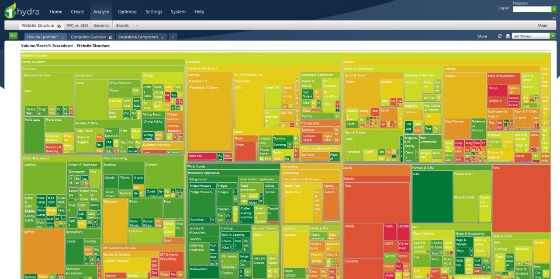
This enables you to overlay any two metrics. The above chart shows tens of thousands of categorised keywords and metrics aggregated for a set time period.
SEO and PPC Integration
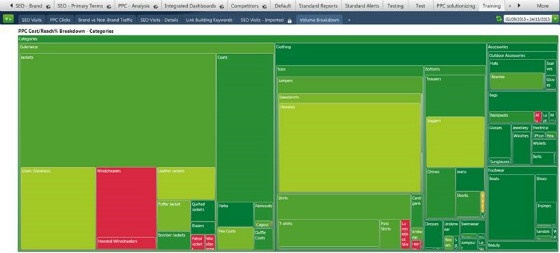
Similar to the ‘tag map’ but showing PPC spend aggregated by category over a two and half month period, this report shows spend and potential cannibalisation. For example, is PPC stealing clicks you would have got anyway?
Competitors
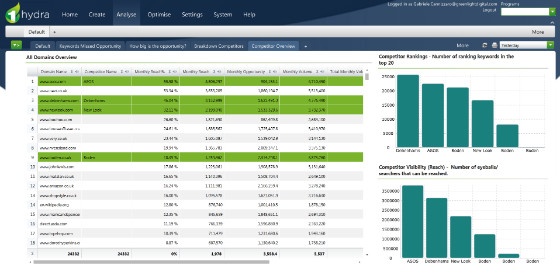
This is an overview of natural search performance for a basket of keywords. The top bar chart shows the number of ranking keywords in the top 20 in Google and the bottom bar chart shows visibility.
Optimise
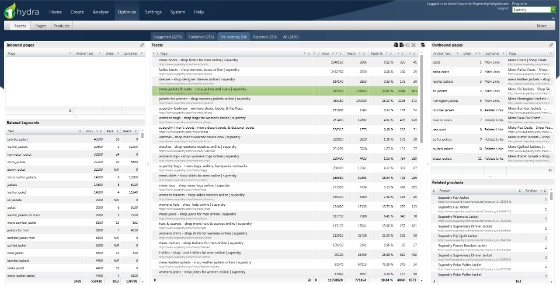
This interface shows recommendations for potentially missing pages from your taxonomy and presents recommended pages.
Duplication Manager
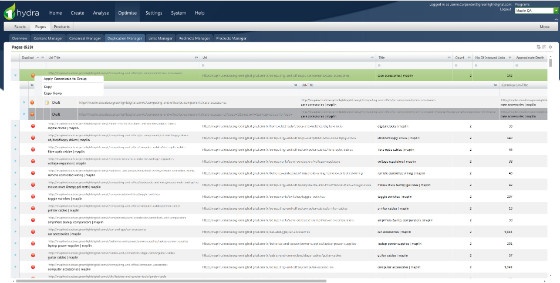
This highlights duplication and auto calculates which page is the strongest in terms of SEO best practice and recommends where to apply the canonical and what the URL should be.

For websites that have hundreds of pages and thousands of products, managing the recommendations from OneHydra can be a big job, even for the most talented in-house SEO expert.
The tool can throw up thousands of potential site improvements, keyword changes and new category opportunities. Therefore, having an SEO agency on board can help ease the pain and help maximise on the opportunity. An agency can see the quick wins and strategise accordingly by pulling PPC and SEO together.
Keeping on top of content can be a challenge, especially when keyword trends come and go quickly. However, this is when revenue gains can be made. If a particular fashion trend hits the red carpet at the Golden Globes – let’s say dresses with butterfly motifs become flavour of the month - the retailers quick enough to jump on this bandwagon will see sales increase.
Knowing this is what your customers want, and then being able to tailor your keywords to show for ‘Golden Globes’ and ‘butterfly dresses’ could prove a quick win. Having an agency on board can cut the turnaround on this, getting your products in front of your customers quicker.

Used as part of a comprehensive digital marketing strategy that includes SEO and PPC, the OneHydra tool can save companies time and money, provided its many recommendations are implemented.
However, clients need to weigh up the value versus the cost, and the savings versus potential revenue. For example, this system can track an unlimited number of keywords. However, if you can only manage to implement 50 of its changes, does the scale of its operation really have an impact?
If an agency charges you £90 per hour, and an enterprise-level solution costs £19,000 per month, you have to believe this is saving you at least 200 hours of work. There has to be a breakeven point. It has to save time and have a monetary benefit (i.e. increased sales) in order to justify the outlay.
Similarly, as with any SEO tool, there are some limitations. While OneHydra provides one of the most in depth keyword research and insight platforms to date other considerations of a full SEO strategy such as localised ranking checks and backlink profiles are either not available or are included at a basic level only.
The value of an enterprise-level tool such as OneHydra is always down to the ongoing benefits of its data. OneHydra’s keyword research may be unlimited, but the man-hours of your marketing team is not. The amount of data that can be managed by a team is always going to be the final factor in scale.
Keyword research can be conducted using Google Search Console (previously Webmaster Tools), historical PPC campaign data, SEM Rush, Google’s Keyword Tool, custom scraping of Google, or via our own proprietary keyword mining research tools.
The number of keywords found by any of these methods can exceed one million. Processing keywords and gaining insight is a known process, but this needs to correlate with the man hours needed to do this. You can have one million keywords, but the reality is that managing 5,000 new keywords will keep a large team busy for a long time.
The process of automatically creating new pages and content is, again, not new. Technology exists to setup such processes so that an in-house team can then roll out new content in five minutes. However, you still need to check the page and its keywords before pressing ‘Go’.
Combining this automatic setup with the internal linking information that OneHydra provides is a nice service, but again it’s not new. Page rank sculpting tools are readily available to do this at scale.
CEOs and project managers like to have a wide overview of everything that is possible and what keywords to focus on. However, what amount of your keyword universe can be implemented in terms of actionable insights?
Complete automation is fantastic, except you might get caught out with a keyword that doesn’t quite fit. Just like flying a plane, autopilot will get you from A to Z the majority of times, but you still need a pilot on board to oversee the process, in case something goes awry.
More articles you might be interested in:
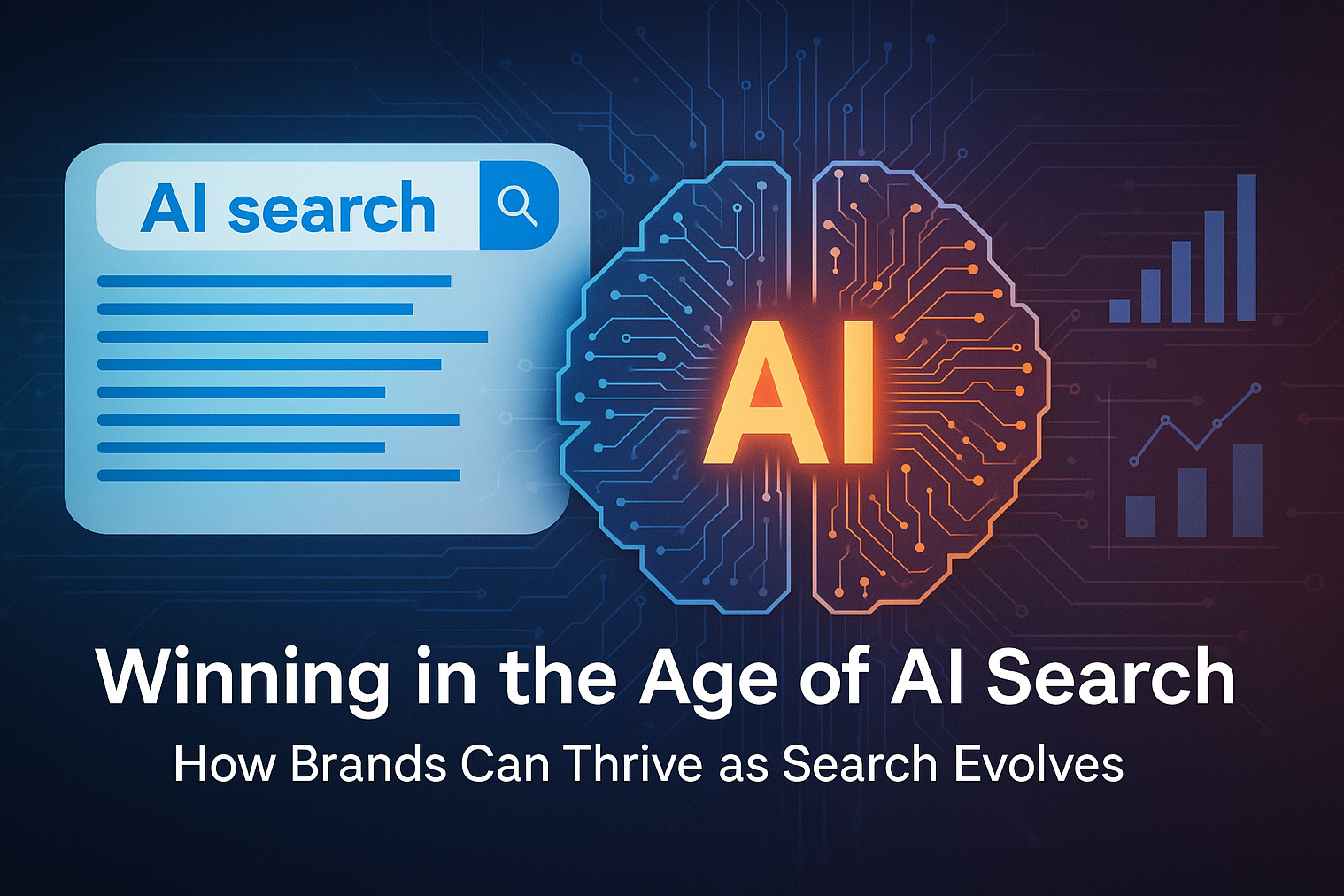
Search is changing faster than ever. With the rise of AI-powered features like Google’s AI Overviews and AI Mode, the familiar “10 blue links” are...
Read more


Arming yourself with the right tools to ensure a smooth site migration is important - find out how to protect your SEO during a migration today.
Read more
Google employees have recently announced that the upcoming Google Core Update is set to be released in the coming weeks. Understanding and addressing...
Read more
Language matters. Any marketer worth their salt knows this. But when discussing gender and sexual orientation, that importance is amplified tenfold.
Read more
When marketers think of thought leadership, there are names rather than ideas, that tend to spring to mind.
Read more
With the release of GPT-4, how revolutionary will this tool be? Alan Rowe takes us through it...
Read more